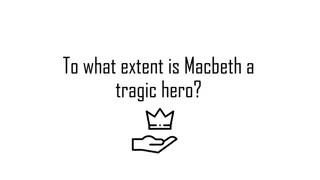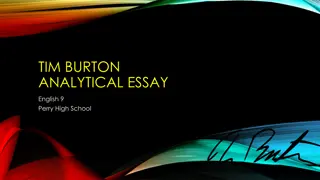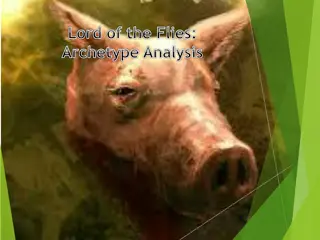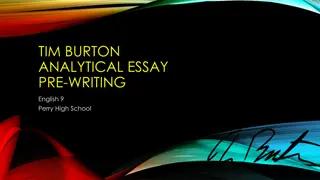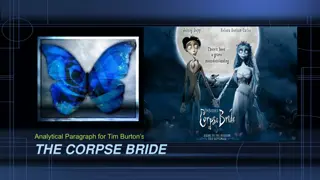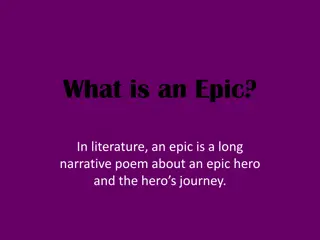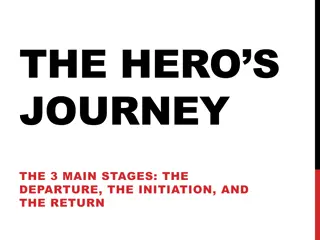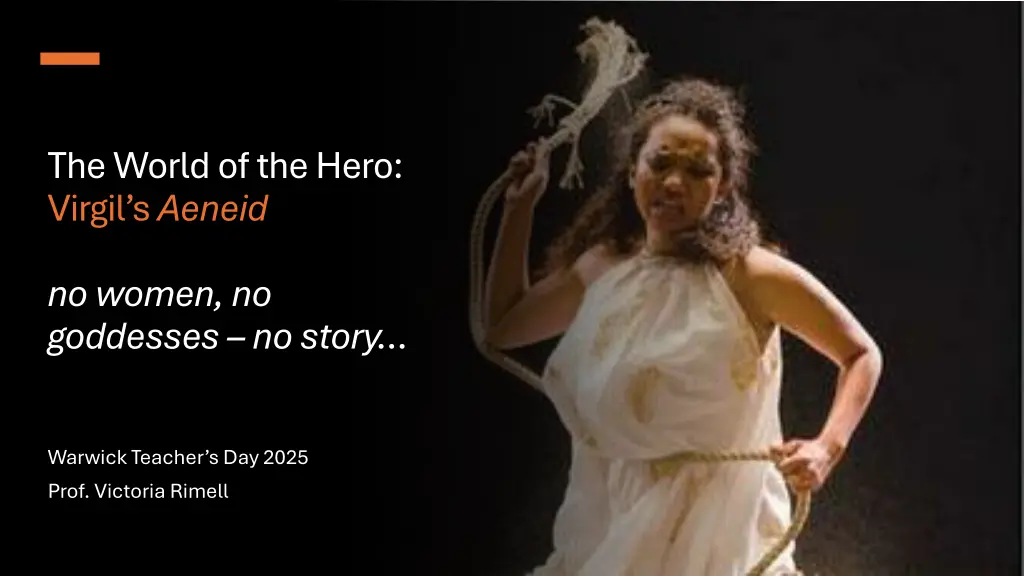
Exploring Virgil's Aeneid: Interpretation and Perspectives
Delve into the deep-rooted histories of interpreting Virgil's Aeneid and the inflections of classical scholarship on how the text is introduced and described. Discover the concealments and taken-for-granted perspectives in this epic poem, from the foundation of Rome to the portrayal of women, gods, fate, and the brutal truths of war. Uncover the complexities of heroism, morality, power struggles, and the underlying themes of masculinity within the Aeneid's narrative.
Download Presentation

Please find below an Image/Link to download the presentation.
The content on the website is provided AS IS for your information and personal use only. It may not be sold, licensed, or shared on other websites without obtaining consent from the author. If you encounter any issues during the download, it is possible that the publisher has removed the file from their server.
You are allowed to download the files provided on this website for personal or commercial use, subject to the condition that they are used lawfully. All files are the property of their respective owners.
The content on the website is provided AS IS for your information and personal use only. It may not be sold, licensed, or shared on other websites without obtaining consent from the author.
E N D
Presentation Transcript
The World of the Hero: Virgil s Aeneid no women, no goddesses no story Warwick Teacher s Day 2025 Prof. Victoria Rimell
The bigger picture How do we introduce and describe Virgil s Aeneid? How are these basic ways into the text inflected by histories of interpretation in classical scholarship on Virgil? What interpretative perspectives do they conceal, or take for granted?
the foundation of Rome what it is to be a post-Homeric hero Rome s divinely sanctioned destiny as an empire gods, fate, and the relationship between mortals and immortals praising Augustus and the Augustan regime the cruelty of war Virgil s creative response to/rewriting of Homer who will be the new Achilles (and the new Hector ) the development of traditional Roman moral values pietas, moderation, self-control fathers and sons, kings and battles the ancient world of men and war [OCR World of the Hero book: The World of the Hero is a man s world, and the women in it are always seen in relation to men and the war. ] The Aeneidis a poem about
The world of the hero civil war the suffering of refugees the lasting legacy of trauma men fighting over a woman the problem of male desire the impossibility of masculinity matricide as a condition of possibility for patriarchy the conquest, oppression and erasure of women the use and abuse of military power the colonialist-imperial project The immorality of war the politics of remembering and forgetting violation of the natural world in the name of empire whose story gets told in Augustan Rome, and whose doesn t. Or, what the glorious empire under Augustus conceals / sacrifices Or The Aeneidis a poem (also?) about .
OCR p.67 OCR p.67: The World of the Hero is a man s world, and the women in it are always seen in relation to men and the war. OCR p.190 OCR p.190:The most memorable mortal char acters in the Aeneid are, for most people, Dido, Camilla and Amata. Not only are they vividly presented in terms of psychological make-up, but they act with daring and impose their own wills on the man s world of the hero. Without them the Aeneid would lose much of its emotional intensity and dramatic action. Aeneas is viewed in literature through out the ages more in relation to Dido than as a Roman hero. It is the two female immortals, Juno and Venus, who dominate activity on Olympus, and who are vividly characterised. Despite these outstanding independent and feisty creations, women in the Aeneid are defined in relation to men. They are wives, widows, mothers, daughters, sisters or victims of war. We have a limited view of them What s at stake? Is this a women problem?
women in the Aeneid or the politics of gender There is no reading of the Aeneid, no topic or theme in the Aeneid, that does not involve gender; what it is to be a (male) hero is always contingent on how the masculine is constructed in relation to the feminine. Power is a gendered system. So is history (discuss )
Vergil and the Feminine (2021) Vergilius67, Giusti and Rimell eds. p.13: ..Feminist thought starts with a critique of the concealed, universalizing tendency that conflates human with male/masculine and disappears female subjecthood p.14: One way of defining the process of feminist reading is as full immersion in the question of who gets to determine what or how texts mean as an acutely political wrestling between competing claims to power, creative potential, visibility . P.16. Reading Vergil reminds us that we cannot understand patriarchy as a historical phenomenon if we do not consider how it arises from a complex, context-specific interaction of materiality and ideas, overlaid by the cultural subordination of feminine materiality to masculine idea .
Gendered structures Masculine imperium feminine furor Conqueror conquered Masculine West feminine East Reason emotion Master slave Man-god female-animal Sanity madness (e.g. Dido) Self-regulation/non-dependency untrammelled desire Masculine idea feminine materiality Master of the gaze object of the gaze (e.g. Lavinia) Seducer - seduced Penetrator penetrated Upright stance/rectitude off-balance/horizontal Apollonian - Bacchic Phallic drive/teleology (e.g. Jupiter setting his wife straight at 12.793ff.) - -vs - regressive feminine circularity Upper Olympian world (Jupiter the statesman) vs disruptive chthonic female deities (Allecto, Juno, Furies, Circe and the sirens..)
Starting points The politics of gender, always tied up with the politics of ethnicity and race, is an unstable process unstable process written into the very plot of the Aeneid. i.e. The Trojans conquest, failure, and abject status as refugees are made inseparable from their constructed identity as effeminate easterners. They are stereotyped by the hardy, salt-of-the-earth or silvan Latins as effeminate cowards, soft lovers (Aeneas is dubbed another Paris ) who wear their hair in perfumed ringlets. See e.g. Turnus boast boast as he takes up his sword in Aen Turnus 100 : Aen.12.97 .12.97- -100 the body of that Phrygian eunuch ( the body of that Phrygian eunuch (semiviri shatter his breastplate with my powerful hand, and shatter his breastplate with my powerful hand, and defile his hair with dust, that s curled with a heated iron defile his hair with dust, that s curled with a heated iron ( (calido calido ferro ferro) ), ,and drowned in myrrh and drowned in myrrh allow me to lay low allow me to lay low semiviri), tear off and ), tear off and
But avoid men who profess elegance and good looks, who arrange their hair carefully in place. What they tell you they ve told a thousand girls: their love wanders and lingers in no one place. Woman, what can you do with a man more delicate than you, and one perhaps who has more lovers too? You ll scarcely credit it, but credit this: Troy would remain, if Priam s/Cassandra s warnings had been heeded. Some will attack you with a lying pretence of love, and through that opening seek a shameful gain. But don t be tricked by hair gleaming with liquid nard, or the tongue of a belt tucked tightly into the creases it makes: don t be ensnared by a toga of finest threads, or that there s a ring on every finger. Ovid, Ars Amatoria 3.433-46: unmanly men and lying Greeks Cf. Aen.4.569-70: varium et mutabile semper / femina
Iarbas Iarbas at at Aen And now that Paris with his eunuch train (semiviro comitatu comitatu), his chin and perfumed locks bound with a Lydian turban, grasps the prize Aen.4.215 .4.215- -17: 17: semiviro Half-men Trojans Numanus Numanus Remulus All our life is worn down by the use of iron (ferro our bullocks flanks with a reversed spear, and slow age doesn t weaken our strength of spirit, or alter our vigour: we set a helmet on our white hairs, and delight in collecting fresh spoils, and living on plunder. You wear embroidered saffron and gleaming purple, idleness pleases you, you delight in the enjoyment of dance, and your tunics have sleeves, and your hats have ribbons. O truly you Phrygian women, as you re not Phrygian men Phrygian women, as you re not Phrygian men Remulus at at Aen Aen.9.609 .9.609- -17: 17: ferro): we goad
Becoming a (Ro)man: the poems trajectory In moving Westwards - in rejecting the oriental-African-feminine in Dido (who must be sacrificed/killed), in mingling with the masculine bodies of the Latins and in conquering them, in becoming the new Greeks , coded after Troy s fall as the conquerors the Trojans are re-gendered. Crucial in this re-gendering is a process whereby Aeneas is weaned from an emotional attachment figured as itself feminine to Dido, to his mother, to mother-earth in the move towards cultivating a proper masculine invulnerability. This process, activated in our encounter with the liveness of Virgil s poetic language, is gradual, non-linear, continually happening, fraught with contradiction, incomplete.
Turnus arms Turnus arms: the red-hot sword (not hot curling iron!) given by Vulcan ( the god of fire ) to his father, Daunus (12.90-1); the mighty spear, seized with force (93), a spoil of war. Aeneas, Aeneas, fierce in his arms his mother gave him (maternis saevus in armis, 12.107) Arma virumque arms and a/the man (and his mum) Latinus, Latinus, king of the Latins, 12.203-11 (compare Iliad Iliad 1.234 1.234- -7) 7) No day shall break this peace or truce on Italy s side, however things may fall out: nor will any power deflect my will, not if it plunges the earth, drowned in flood, into the waves, and dissolves heaven in hell, just as this sceptre (since he by chance held the sceptre in his hand) hewn, once and for all, from the lowest stem in the woods, having lost its mother, having lost its mother, and shedding its leaves and twigs to the knife, will never will never, now the craftsman s hand has sheathed it in fine bronze, and given it to the elders of Latium to carry, extend shoots or shade from light foliage extend shoots or shade from light foliage. Focus on Book 12
Aeneid 12. 383- 410: Iapyx s failed healing of Aeneas arrow wound. The powers Apollo granted Iapyx while conquered by desire do not work. Mum Venus is forced to step in (411ff.)
Similes, relationality, and (not) forgetting mothers Juturna Juturna (Turnus sister) protecting Turnus at 12.471 12.471- -8 8: : She herself took his place and guided the flowing reins with her hands, assuming Metiscus s voice, form, weapons, all. As when As when a dark swallow flies through the great house of some rich lord, winging her way through lofty halls gathering tiny crumbs and scraps of food for her noisy young, gathering tiny crumbs and scraps of food for her noisy young, now twittering in the empty courtyards, now by the damp ponds: so so Juturna Juturna was drawn by the horses through the enemy centre and, flying in her swift chariot, criss-crossed the whole plain Sister Juturna acts like a mother; later in Bk 12, would-be mother-in-law Amata ( the loved woman ) acts like Turnus mother, or even as his lover (another infelix Dido, 588, or another Jocasta, guilt of a tragic crimen, 600). Poetic language piles up uncanny hauntings.
Aeneid 12.554-6: Aeneas & Venus And now his most beautiful mother inspired Aeneas to advance on the walls, fling his column on the town, and confound the Latins with sudden disaster
Aen. Aen.12.748 12.748- -56 56: the conquered Trojan as masculine Italian (Aeneas) pursued and pressed his anxious enemy hotly, foot to foot: as when as when a hound in the hunt presses on a stag (cervum and barking, one found trapped by the river or hedged in by fear of the Punic/purple feathers (puniceae the stag, terrified(territus territus) by the snares and the high banks, flies backwards and forwards a thousand ways, but the eager Umbrian with gaping mouth, almost has him, and snaps his jaws as though he holds him, baffled (elusus) and biting empty air cervum), , chasing puniceae pennae pennae): Umbrian clings close Compare Ovid, Ovid, Metamorphoses Metamorphoses 1.533 1.533- -8 8 (Apollo chasing Daphne) And And Aeneid Aeneid 4.68 Carthage, wounded by an arrow that a shepherd has shot from afar even as she leads her guest Aeneas) 4.68- -73 73 (Dido as a deer [ [cerva cerva], ], wandering in frenzy through the city of
A book of similes: Lavinias blush Aen Aen.12.64 .12.64- -70 70 Lavinia listened to her mother s words, her burning cheeks wet with tears, while a deep blush kindled their fire, and spread over her glowing face. Her virgin looks showed such colour, just as stains Indian ivory with crimson dye, or as white lilies redden when mixed with many a rose. Love stirred Turnus, and he fixed his gaze on the girl (illum illum turbat turbat amor amor figitque figitque in just as when one in virgine virgine vultus vultus)
Lavinia is destined to marry Aeneas. One blush is as far as she gets in expressing herself in the Aeneid . She does not have to make any moral decision that is her father s problem and as a young girl still she is not subject to the over- emotional outbursts of her mother. It is almost as though she does not exist, except as an object to be fought over. Romans were used to arranged marriages, and would not have found her silent acquiescence as unsettling as the modern reader might do. Almost as if Lavinia doesn t exist (OCR The World of the Hero, p191)
See Lyne 1983 on the traditional view of Virgils similes as interludes, or as illustrative, light relief. Instead, similes add something, they narrate, advance the action, act as a clandestine communication or sustain suspense by substituting unexpectedly. So how does this double simile narrate to us? How does it open up a gap in which we can imagine Lavinia s subjectivity, what she is feeling? Yet the simile takes us away from Lavinia in opening this gap. It is very reminiscent, for example, of the famous simile describing wounded Menelaus in Iliad4.141ff. ( as when a woman stains ivory with scarlet, some woman of Maeonia or Caria ). So by allusion Lavinia is cast as someone wounded and on fire. Is she in love? Whose amor disturbs Turnus? The simile: just as as when one stains Indian ivory with crimson dye just
Homer Iliad 4.141-7 As when a woman stains ivory with red, a Maeonian or Carian woman, to be a cheekpiece for horses; and it lies in the chamber, and many horsemen long to carry it off, but it lies there, the king s treasure, both an ornament for the horse and a glory for the driver, so were your thighs stained with blood, Menelaus, your shapely thighs and calves and lovely ankles below.
But in such sorrows, O Hortalus, nevertheless I send you these translated poems of Callimachus, lest you think that your words, entrusted in vain, have slipped perhaps from my mind to vagrant winds, as an apple sent by a fianc 's secret tribute, runs out from the maiden's chaste lap because placed under the poor forgetful girl's soft robe, when she jumps with her mother's arrival, it's cast out, and in a prone hurry, headlong drives that thing guilty blush springs from this sad one (huic manat tristi conscius ore rubor) 15 20 Lavinia s blush: Catullus 65 Lyne 1983 Lyne 1983 : Like the closely analogous blush of the girl in Catullus 65, [Lavinia s blush] reveals her embarrassment, even shame, that she has thus (in weeping) opened a window on to her tender feelings for the young Italian prince .
Oliensis 2019, on the simile at Iliad 4.141-7 If the possession of a woman confirms a man s virility, the loss of a woman entails castration. So much is already suggested by the sequence of events: Paris has sex with Helen, Pandarus (a Paris- substitute) wounds Menelaus in the upper thigh. The simile reiterates this association and renders it explicit by identifying the wound with the lost woman. Yet, at the same time that it reveals this injury to Menelaus, the simile disavows it by literally fetishizing the wound: transforming it into a precious object, a thing to be admired and desired, and thereby figuratively restoring to the king the treasure he has figuratively and actually lost
Oliensis 2019, on the blush simile in Aen.12 Observe how thoroughly the Homeric simile is domesticated by this Virgilian reapplication. Decoupled from the thigh wound that Turnus suffers much later in the book, and reattached to the figurative wound of desire (or shame) by which Lavinia is suddenly enflamed, the simile seems to shed all castrative implications. Moreover, though the language is disturbingly violent (cf. sanguineo uiolauerit, 67) and the fire burns shockingly hot, it is still the case that what Lavinia suffers here is nothing other than the figurative equivalent of a woman s proper destiny; what she loses is what she is meant to lose. The restoration of normative gender goes hand in hand with the normalization of the figure. It is not just that Virgil associates Lavinia with appropriately feminine objects (an ivory ornament, flowers). He has eliminated the metaphysical strain in the original figure, with its startling conjunction of bloody leg and beautiful artefact, by supplying the Homeric vehicle, the ivory cheekpiece , with an ideally appropriate tenor: a girl s cheeks (genas, 65).The relation is the more exact in that the word rendered as cheekpiece is actually just a word for cheek ( , Il. 4.142).13 The gap between vehicle and tenor could hardly be narrower.
You are the victor, and the Ausonians have seen me stretch out my hands in defeat: Lavinia is your wife, don t extend your hatred further. Aeneas stood, fierce in his in his armour armour, his eyes flickered, and he held back his hand , his eyes flickered, and he held back his hand: and even now, as he paused, paused, the words began to move him more deeply, when high on Turnus s shoulder young Pallas s luckless sword luckless sword- -belt met his gaze, belt met his gaze, the strap glinting with its familiar decorations, decorations, he whom Turnus, now wearing his enemy s emblems on his shoulder, had wounded and thrown, defeated, to the earth. As soon as his eyes took in the trophy, a memory of cruel grief, Aeneas, blazing with fury, and terrible in his anger, blazing with fury, and terrible in his anger, cried: Shall you be snatched from my grasp, wearing the spoils of one who was my own? Pallas it is, Pallas Pallas it is, Pallas, who sacrifices you with this stroke, and exacts retribution from your guilty blood. So saying, burning with rage, burning with rage, he buried his sword deep in Turnus s breast: and then Turnus s limbs grew slack Turnus s limbs grew slack with death, and his life fled, with a moan, angrily, to the Shades. with death, and his life fled, with a moan, angrily, to the Shades. ( (vitaque vitaque cum cum gemitu gemitu fugit fugit indignata indignata sub * = Aen.11.831 (death of Camilla) Lavinia is your wife, fierce Aen.12.936-end No women to see here? familiar memory of cruel grief, sub umbras umbras* *) )
Pallas flashy Trojan swordbelt acts as a Firestarter (Freudenburg, Virgil s Cinematic Art, 2023) As we have been told in Aeneid daughters of Danaus daughters of Danaus who killed their husbands, the sons of Aegyptus, on their wedding night. Aeneas is suddenly blazing with fury, and terrible in his anger ( blazing with fury, and terrible in his anger (furiis close to Dido in her madness, accensa accensa furore furore (at divine female warmongering, who is allied with the furies, as well as with Turnus at the beginning of the book, swelling with rage like a wounded lion (haud secus accenso In the final line of the Aeneid Turnus dies in an exact repetition of Camilla s death, laid low as a Latin woman , but also echoing Dido s suicidal urge to go to the shades (ire sub umbras) in 4.660, as well as desperate Juturna, in her final words (misero fratri comes ire per umbras, 12.881). Turnus and humiliated, or like a woman. Yet in the play of substitutions in this dizzying non-ending in which he acts as Pallas, or even, as Pallas Athena, Aeneas Aeneas kills Turnus not just as the new Achilles, but also as suicidal Dido, as vengeful Juno, as a daughter of Danaus, and as his fiery fraternal twin, Turnus (son of Daunus). Aeneid 10 10, the swordbelt is engraved with the story of the Danaids, the 50 furiis accensus accensus et ira / terribilis), so Aeneid 4.697, as she dies) 4.697, as she dies) , and to Juno, the force of (at Aeneid accenso gliscit violentia Turno, 9). Turnus dies prostate
Becoming Trojan - becoming a woman: 11.768-82 It chanced that Chloreus, once a priest, sacred to Cybele, glittered some distance away splendid in Phrygian armour, spurring his foam-flecked horse, that a hide, plumed with bronze scales, and clasped with gold, protected. He himself, shining with deep colours and foreign purple fired Gortynian arrows from a Lycian bow: the weapon was golden on his shoulder, and golden the seer s helm: his saffron cloak saffron cloak and its rustling folds of linen were gathered into a knot with yellow gold, his tunic and barbaric leg barbaric leg- -coverings embroidered by the needle coverings embroidered by the needle. The virgin huntress (i.e. Camilla i.e. Camilla), singling him out from all the press of battle, either hoping to hang his Trojan weapons in the temple, or to display herself in captured gold, pursued him blindly, and raged recklessly through the ranks, with a feminine desire for prizes and spoil (femineo praedae et spoliorum ardebat amore) and foreign purple, rustling folds of linen
Allecto, the personification of destructive jealousy, is female. The defining quality of women in the Aeneid seems to be their irrationality or furor, and consequent tendency to upset the male order of things. Dido and Amata are obvious examples. Can we tell anything about Virgil s attitude towards women from the Aeneid ? For example, Hermes says, Women are unstable creatures, always changing , and the skilful, brave and heroic Camilla burning with all a woman s passion for spoil and plunder is brought down by a weakness for a rather nice embroidered cloak and tunic! OCR The OCR The World of the Hero World of the Hero, p.191 Women and emotional instability , p.191
No women, no goddesses gender politics, no story Discuss
Further reading Barchiesi, A. (2015) Homeric effects in Vergil s narrative, Princeton Cairns, F. (2005) Lavinia s blush (Virgil, Aeneid 12.64-70 in Cairns (ed.) Body language in the Greek and Roman worlds, The Classical Press of Wales, 195-214 Freudenburg, K. (2023) Virgil s Cinematic Art, Cambridge. Giusti, E. (2020) Aeneid 12: a cyborg border war , in G,M. Chesi and F. Spiegel (eds.) (2020) Classical Literature and Posthumanism, London, 275-83 Giusti, E. and Rimell,V (2021) Virgil and the Feminine. Vergilius special issue Lyne, R. O. A. M. (1983) Lavinia s blush , G&R 30: 55-64 Lyne, R.O.A.M. (1989) Narrative through Imagery in Words and the Poet. Characteristic Techniques of Style in Virgil s Aeneid, Oxford. Mac G r in, F. (2017) The poetics of vision in Virgil s Aeneid Harvard Studies in Classical Philology `09: 383-427. Mac G r in, F. and C. Martindale (eds.) (2019) The Cambridge Companion to Virgil, Second Edition. Cambridge Oliensis, E. (2019) Menelaus wound (and Lavinia s blush Classical Quarterly 69, 35-41. Tarrant, R. (2012) Virgil Aeneid XII, Cambridge Greek and Latin Classics (Introduction).



